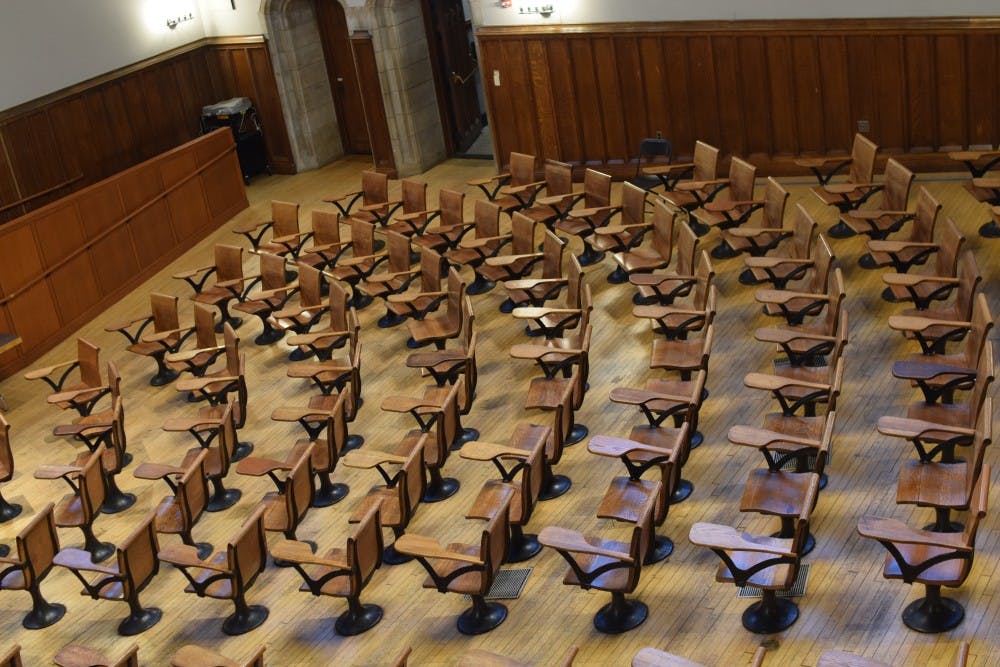Last week marked a year since our education moved online. The last 12 months have been chaotic, trying, and seemingly unending.
It’s only natural that we start to feel a sense of burnout. Students are spending endless hours on screens, without the usual extracurricular supports that make the amount of work in a Princeton semester manageable.
I am in some of my favorite classes I’ve taken at Princeton. With distribution requirements behind me, I’ve had the chance to explore the topics that most interest me. And yet, I often find myself struggling to remain passionate about my academics — not for lack of interest, but for sheer lack of energy.
I’m confident that faculty are likewise feeling the cumulative effects of a year of remote teaching. Professors have redesigned their courses, assignments, and exams to best accommodate virtual learning — all while caring for their families, in many cases.
Last week also marked a year since we had a true midterm break. In both the fall and spring semesters, our usual week-long breaks have been shortened to just two days. But those two days were hardly a break. Most students I’ve spoken to had exams or papers due either during or right after break, leaving them with the choice either to work through the break or to actually take time for themselves and thus do worse on their assignments.
Juniors and seniors with independent work lost the critical time uninterrupted by classes to devote to their projects, which would have been a valuable opportunity to make progress on their research. Now, students have less time and support and fewer resources than in a normal semester to complete the same amount of work. This is not to mention that the condensed academic calendar means projects are due sooner than in previous years. Thus, the University has increased student stress during what is already, for many, the most difficult period of our lives.
This has all resulted in two consecutive semesters of nonstop work — a pace that is unhealthy for everyone involved. The pandemic should be a time to reimagine what education can look like, with practices that are more forgiving and flexible. Instead, in the face of an incredibly taxing year, the University has adopted policies that are more restrictive, such as limiting spring break, and thereby asking more of their students and faculty in a time when we all have less support.
By shortening spring break, the University shifted a collective burden — stopping the spread of the coronavirus — onto individuals. If they were really so concerned that students would travel during a week-long recess, the administration could have built in rest days spread throughout the academic calendar, as Harvard did. Simply delineating days off is naturally not enough, as argued by the Harvard Crimson editorial board. The University would have to do what it refused to during our truncated break: protect those days as an uninterrupted break for students, preventing professors from forcing students to work through them by creating assignments due during or immediately after those days. Doing so, though still imperfect, would at least allow students and professors to have some opportunities to rest and recharge. Instead, the University just erased the break with complete disregard for the consequences.

College should be challenging, yes, but not needlessly so. When students say they are burnt out, the administration should respond through actions, not words. Trite emails about staying positive and finding time to care for yourself don’t change the lived realities students face, unless they can be used as a pass for an extension or absence from class.
If the University’s policies don’t enforce time off for students by ensuring professors do not assign work, students don’t get that time off, plain and simple. It is unfair to shift the burden to individual students to ask for exceptions when the University is communicating that students should not need more support than they are providing. When the University implies through its policies that students should be humming along as normal this semester, those who justifiably feel unmotivated and exhausted feel alone in those experiences. They start to doubt why their feelings don’t align with the normalcy the University is projecting, and they question whether they ought to feel that way, whether it is their fault. However much the University claims to care about students’ mental health, its policies are not supporting us.
It would be one thing if the University maintained its lofty standards during the pandemic. But it has actually raised those standards, asking students, faculty, and staff to do more with less.
To varying extents, all faculty, staff, and students are burnt out. Tired of the pandemic, of Zoom, and of balancing work and home life when the borders between them are disappearing, we all deserve a break. A real, substantive break. A year into virtual life, the University ought to have learned this by now.

Julia Chaffers is a junior history concentrator from Wellesley, Mass. She can be reached at chaffers@princeton.edu.








